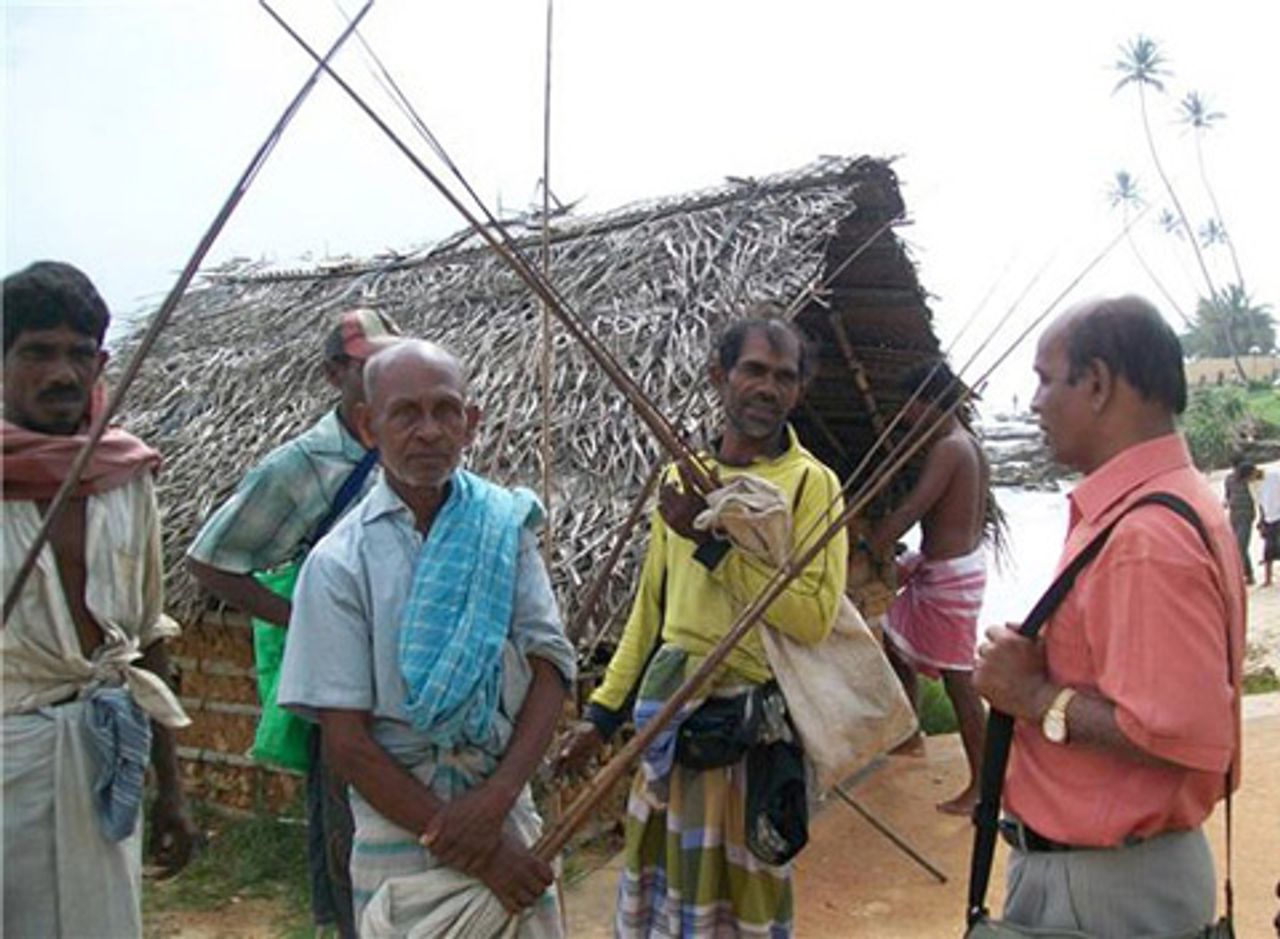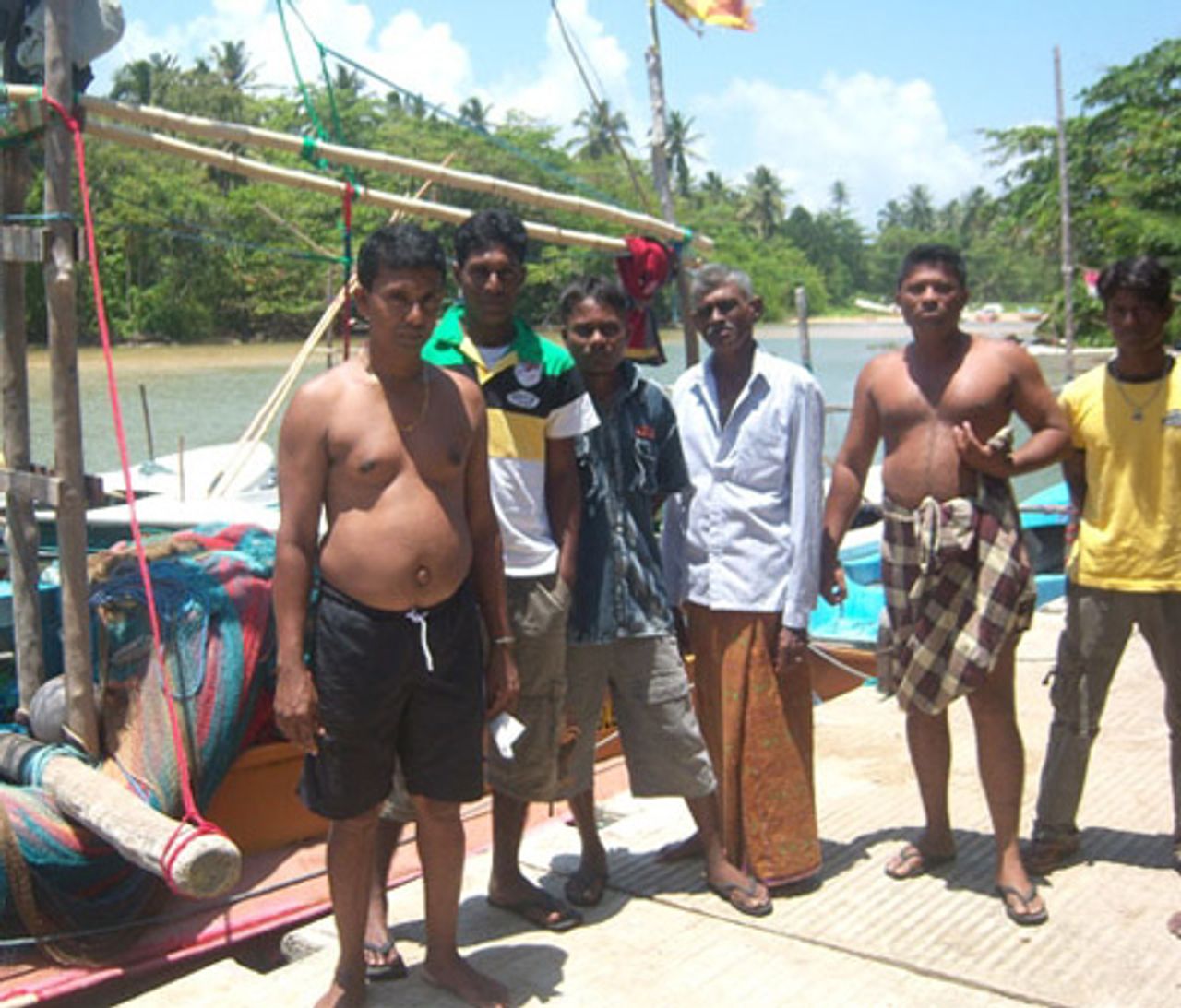As part of the Socialist Equality Party’s campaign for the Southern Provincial Council election on October 10, SEP supporters visited several fishing villages in the Galle district. The party is standing a slate of 26 candidates for the district.
Fishing is the main industry along the coastal belt in the Southern Province. Southern fishermen, like their colleagues in other parts of the island, mostly live in impoverished conditions. They lack modern fishing equipment and rising fuel prices have severely affected them.
These areas were among those hardest hit by the December 2004 tsunami. According to official figures, the tidal wave killed 4,256 people, destroyed 7,032 houses and damaged another 7,680 dwellings in the Galle district. In the Matara district, the death toll was 1,321, with 6,652 injured and 601 missing. A total of 2,233 houses were destroyed and 6,075 were damaged. In the Hambantota district, 3,017 were killed and 4,057 houses damaged.
 Stilt fishermen speak with SEP member
Stilt fishermen speak with SEP memberMost fishermen we met expressed their hostility to the local politicians from all the major parties—the ruling United Peoples Freedom Alliance (UPFA), the opposition United National Party (UNP) and the Sinhala extremist Janatha Vimukthi Peramuna (JVP). None of these parties have kept their promises to improve fishermen’s conditions.
Fishermen said they had no expectation that their situation would improve after the elections under any government. Most said they would not vote for any party. They had hoped that the end of the nearly three-decade civil war would lead to a solution of their pressing problems. But conditions had only worsened.
Unable to afford modern machinery, most fishermen use very primitive methods. Stilt fishermen in Koggala, 16 km from Galle, are an example. They usually fish during the daylight hours, balancing about two metres above the water on a cross bar, called a petta, attached to a vertical wooden pole. They hold the stilt in one hand and a fishing rod in the other.
The daily earnings of stilt fishermen are less than 200 rupees ($US1.75), even for a successful day. They live in single-room, thatched houses and are unable to afford to pay for their children’s education or other basic needs.
Ariyadasa, 72, a stilt fisherman, told us: “I start early in the morning but still only catch fish worth about 80 rupees [by mid-day]. If I work till afternoon I could earn about 200 rupees.” He has a granddaughter working in an apparel factory in the Koggala Free Trade Zone (FTZ) for a monthly salary of just 6,000 rupees ($US52). His entire extended family, including his granddaughter’s two children, live on the income earned by the two of them. “It is a very hard life, with sky-rocketing food prices. If the government continues increasing prices we will die from starvation,” he said.
Gunadasa, 50, another fisherman, commented on the civil war: “Before the war some fishermen went from here to Mannar and Jaffna [in northern Sri Lanka] to fishing. The war stopped that and they vanished. Those Tamil fishermen are our brothers. Our fishermen collectively worked with them. Who will give us money to live or any concession? We thought that after the war ended, the government would solve our problems. Food prices go up day by day. No one has any concern for poor people like us.”
 Balapitiya fishermen
Balapitiya fishermenThe SEP team campaigned in Hiraywaththa, a fishing village in Ambalangoda that was badly hit by the tsunami. Damaged houses, some with their walls down or without roofs, could still be seen. Some affected families were given just 100,000 rupees from the government, which was enough to repair one room. Some received small houses from non-government organisations. Some got nothing.
M. Mervin, 42, a fisherman, and his wife, R.M. Swarna Mallika, described their difficulties after their house was destroyed by the tsunami: “We were left with only four cracked walls. We got only 100,000 rupees from the government. What can be done with such an amount? We could repair only one room. We haven’t had a good sleep yet. We wrote a letter to President Mahinda Rajapakse, but to no avail.”
Their small plot of land was purchased from the money earned by Mallika working as a housemaid in the Middle East. It took many years for them to build their house. The whole family with five children lives in only two rooms. Mervin said: “My second son joined the army because we are poor. If one of our children gets married, how we can live in this house?” Their son, who is still serving in the army, spoke briefly about the horrendous conditions in the fighting.
Mervin spoke about the Ambalangoda fisheries harbour, one of two harbours built as a part of an Asia Development Bank-financed project in the province. “It is very difficult to launch our boats in the night because two lights in the lighthouse are not working. The stone wall around the harbour has not been properly built to control the waves. So, our boats get damaged by knocking against the wall when we try to enter the harbour. But the government claims in the media that it is a well-built harbour. Now these days we can’t go fishing due to this rough season. We have no income.” He added he had “no interest in this election”.
Another fisherman, Neil Priyantha, criticised the government, local politicians and officials for their poor living conditions since the tsunami. His family lives in a small house near the sea. “I didn’t get anything after the tsunami. [Former UPFA Chief Minister] Shan Lal provided houses for his supporters.” Priyantha uses a rented boat and must hand over half his earnings to the boat owner.
R.G. Karunasena, 66, had been fishing from the age of 17. He said local fishermen wanted to build up the area near the shore to facilitate the launching of boats. His father and a long list of other men had died as a result of sand accumulating and tipping boats over. A disgusted Karunasena told us: “Fisheries ministers, including a JVP minister, have come and promised to help us. Nothing happened.”
More than 500 fishermen in Ambalangoda and nearby Balapitiya staged a protest in Balapitiya town on September 8 against the local UPFA politicians’ attempt to interfere with the enforcement of a court order banning trawlers from fishing within seven kilometres of the shore using light course (placing a light in the water to attract fish).
Sudath Deshaprity, the convener of the protest, told us: “Big businessmen are sending trawlers to fish using light course. That method causes extensive damage to all aquatic resources, creating hardship for offshore fishermen who use small boats in swallow water.
“Now with the support of the local leaders of the government, those businessmen are continuing to defy the court order. We have informed the Galle branch of the Fisheries Ministry but they have done nothing. We asked for the fisheries inspector. He has not replied.”
Fishermen, like farmers, need to have their debts written off and be provided with cheap credit, access to modern fishing gear and boats. Decent housing schemes and other essential services are also urgent. The 60-year experience of these fishermen since Sri Lankan independence is they cannot obtain even this most basic assistance under capitalist governments.
